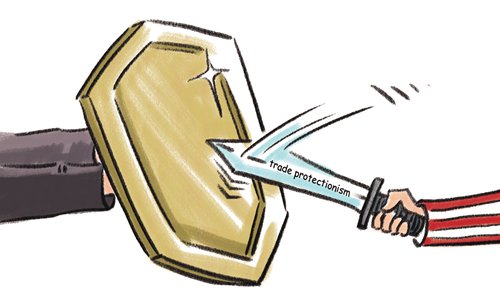For the last few days, US President Donald Trump has been creating one controversy after another all along his trip through Europe. During the NATO summit in Brussels, Trump neither followed the standard protocol nor the agenda of the event. His complaints against Europe continued in London before and after his meeting with British Prime Minister Theresa May. According to him, May played too soft against the EU and that wouldn't be good for US-UK economic relations.

Illustration: Liu Rui/Global Times
July 16 was the chosen day for Trump's last performance. This time he shared the stage with his Russian counterpart Vladimir Putin. Before the meeting, he paved the way with some declarations on CBS. He said that the EU (and China) was a "foe" to the US because of trade issues. And, as he said before embarking on his European tour, it would be easier to negotiate with Putin than with friends and longtime allies.
Since Trump entered the White House with his "America First" agenda, international relations got strained. The dynamics turn into a "conflict synergy." In his view, everything is just a big zero-sum game.
Actually, countries are interdependent but need each other for the functioning of the international order and their own survival. Thus, when the EU appears under attack by its traditional ally, it is natural that it will seek a new partner. Currently, China-EU relations can be developed to reach a "win-win" situation.
Another important event took place on July 16. But this one was between the EU and China. European Commission President Jean-Claude Juncker and President of the European Council Donald Tusk represented the EU at the 20th EU-China Summit in Beijing. China was represented by Premier Li Keqiang.
Juncker and Tusk also met President Xi Jinping.
"I have always been a strong believer in the potential of the EU-China partnership. And in today's world where partnership is more important than ever before, our cooperation simply makes sense," said Juncker at a press conference following the summit. "Europe is China's largest trading partner and China is our second largest. The trade in goods between us is worth over 1.5 billion euros ($1.74 billion) every day. But we can do so much more. That is why it is so important that today we have made progress on the Comprehensive Agreement on Investment through the first exchange of offers on market access."
Indeed, the existing EU-China 2020 Strategic Agenda for Cooperation settles on a common working field, where their mutual interests are reaffirmed and differences accepted. By prioritizing the goals, China and the EU will be able to achieve sustainable and inclusive economic growth. But that is not an easy job.
Experts from Brugel, Chatham House, China Center for International Economic Exchanges and the Chinese University of Hong Kong put together in a joint report a set of challenges that both countries should overcome. First, a greater market access would be granted if an investment agreement has been concluded between China and the EU. "The aim of such an agreement is to create a more open, transparent and secure environment for greater future flows of investment." This initial investment agreement can be followed by establishing open negotiations for an EU-China free trade agreement.
Besides market issues, China and the EU share similar objectives in relation to energy security and climate change. In 2017, Trump withdrew the US from the Paris climate deal. China and the EU can work together toward the Paris goals. In 2016, both players signed an energy cooperation roadmap. They can jointly work on climate finance and green development finance.
"Made in China 2025" policy alongside Belt and Road initiative and science, technology and innovation cooperation could bring together a more open common market and create networks across borders. Not only could it overcome concerns about market access and protection of intellectual property rights, but could also work on different fields such as agriculture technology development, green technology or healthcare by setting up cross-border public and private research centers.
The EU and China can become the standard bearers of global governance by defending multilateralism, cooperation and the world's interests. But, Brussels and Beijing should acknowledge that their partnership doesn't need to be a disadvantage to the US. A real equitable "win-win" situation comes from letting anyone be part of it. Let's prove to Washington that no one is a "foe" to no one.
The author is a foreign policy analyst based in Europe.


